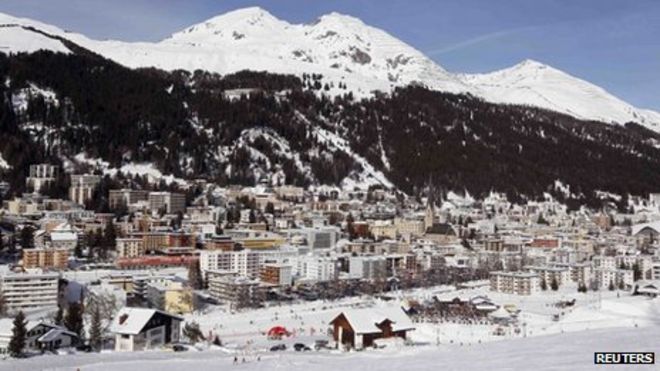- 24 January 2012
- Business
日志
Davos 2012: Has capitalism got a future
||
Davos 2012: Has capitalism got a future?

Has capitalism got a future? Is it fit for the 21st Century? And if it has and is, how must capitalism change?
The organisers of this year's World Economic Forum (WEF) have put some pretty crunchy questions on the agenda.
But as more than 2,600 of the world's richest and most powerful people come to the Swiss mountain village of Davos to discuss the state of the world, is it a topic that they want to talk about?
For some, these are clearly the right questions. "Is capitalism working? Will we grow again? Is the Western model still working?" asks John Griffith-Jones, the UK and Europe chairman of accounting giant KPMG.
"I'm really interested in hearing people talk about that," he says.
Mr Griffith-Jones talks of the need to find a "concept of responsible capitalism" and worries that even if Davos man and woman find a consensus, it will not be one that is very clear to people in the wider world.
The founder and driving force of the forum, Prof Klaus Schwab, is even blunter. "Capitalism in its current form no longer fits the world around us," he says.
Occupy WEF
Those are statements and questions that one would rather expect to hear from the anti-capitalist protesters who have come to Davos, and who were busy over the weekend building snow igloos and preparing a 50-people camp as part of their Occupy WEF protest.

"We'll make small actions in the village. We're going to disturb things a little bit,'' says organiser David Roth, president of the Swiss social democrat youth organisation Juso, as he prepares to camp out all week.
But heavy snow, bitter cold and the highly efficient forces of the Swiss police and army will make major protests unlikely.
It will be left to the WEF's participants and organisers to highlight the world's failings.
Prof Schwab speaks of a "dystopian future", where political and economic elites "are in danger of completely losing the confidence of future generations".
Indeed, a global survey released just days before the start of Davos, the Edelman Trust Barometer, suggests there has been a sharp drop in public trust, not just in in business but especially in governments around the world.
Davos, in its very own way, illustrates that even for well-paid business leaders, the scars of the economic crisis of the past four years are still painful.
The eurozone, the financial sector, poverty, inequality, corporate responsibility and the rise of China: They all feature heavily in both the sessions organised by the forum, which is always eager to lob in a few inconvenient questions, and the topics of many of the events organised by banks, industry groups and corporate giants.
It is gloomy business, albeit discussed while scoffing haute cuisine breakfasts, lunches and dinners in Davos' five-star hotels.
Good news
There is a danger, says David Jones, chief executive of French advertising firm Havas, that amid all the gloom the good news will be overlooked.
"I believe that things will not be as cataclysmic as many predict," he says, pointing to how China and India are still growing well, and how there has been a few good data out of the eurozone recently.
"But what tends to happen is that one topic will dominate everything."
Mr Jones is worried that key issues such as youth unemployment and global warming could be pushed to the sidelines.
Being fixated on the crisis could also make companies overlook the fact that doing business is changing in very fundamental ways.
Mr Jones calls it the "age of damage", where "social media create a world of radical transparency".
"Whether you are the head of an Arab country, the boss of BP, a misbehaving fashion designer or a footballer," he says, "basically what we are seeing every single day is the power of people to make leaders behave the way they want them to be."
Party is not over
Despite the gloomy mood music, there will still be plenty of the normal "Davos spirit" dominating the discussions in the event's main venue, the Congress Centre, and the surrounding hotels.
After all, no entrepreneur or business leader in his right mind would come to Davos and let the opportunity for some serious networking go to waste.
On Sunday, one investor at the tech-heavy DLD Conference in Munich was busy preparing the ground for some joint fund-raising with other venture capitalists, with the finishing touches to be applied this week in Davos.
And there are still plenty of parties and private dinners to be had. Some more exclusive, others less so.
The future may be uncertain, but as every businessman at the forum will tell you, risks harbour opportunity.
The Davos party is not over yet.
Occupy Davos? Leaders
greeted by doubts about capitalism
'Capitalism, in its current form, no longer fits
the world around us,' forum's founder says
By Terry Milewski in Davos , CBC News Posted:
Jan 25, 2012 8:35 AM ET Last Updated: Jan 25, 2012 12:56 PM ET
The deep snow in Davos this year is no
surprise — but the deep doubts about capitalism certainly are. What
is Stephen Harper getting himself into?
For decades, this ritzy Swiss resort has hosted an annual
celebration of capitalism where luxurious Audis ferry potentates and presidents
between lavish hotels so they can bemoan the perils of socialism, high taxes
and debt. And yet, this year, the veteran founder and Chairman of the Davos
World Economic Forum, Professor Klaus Schwab, declares that "Capitalism,
in its current form, no longer fits the world around us."
Really? Is Schwab, of all people, joining the Occupy Davos
movement? The business professor who's been presiding over these festivals for
the rich and mighty for forty years? Maybe so.
"We have failed to learn the lessons from the
financial crisis of 2009," he goes on. "A global transformation is
urgently needed and it must start with reinstating a global sense of social
responsibility."
Such remarks, from such an insider in the capitalist club,
certainly give a clue to the trauma that has hit the Eurozone in its season of
debt and desperation. Greece and Italy are under new management. The survival
of the Euro remains in the balance.
And into this stew of self-doubt comes Stephen Harper to
deliver a keynote address which is shaping up as something of a scolding. Much
of Harper's message will be familiar to Canadians — that we have come
through the recession better than any other G7 country, thanks to sound banking
regulations, free trade and fiscal discipline. Europe, by contrast, must take
much more decisive action to get its house in order.
Harper sticks to tradition
"The European sovereign debt crisis remains an
immediate and pressing problem," said Harper's press secretary, Andrew
MacDougall, in a preview of Harper's speech.
"It threatens the strong, sustainable balanced growth
that G20 countries have made their priority and risks bringing the world to
another recession."
In other words, Harper's remarks may be much more in line
with Davos tradition than those of its chairman. He will damn protectionism and
over-regulation and, far from preaching a "global transformation" of
capitalism, he will speak up for Canadian-style, well-regulated capitalism with
sturdy "firewalls" against speculative excess.
We'll see how much appetite there is in Europe for this
kind of back-to-basics finger-wagging. Harper believes the traditional model of
capitalism remains the best available engine for growth and
prosperity — but the Davos forum has convened around the idea that
something new is required.
Here's a typically Schwabian sentence from the official
program: "the necessary conceptual models do not exist from which to
develop a systemic understanding of the great transformations taking place now
and in the future."
Poetry, it's not. But that's the mood here now. Chairman
Schwab has ruled that the usual bromides about free trade and free markets
won't cut it anymore. And a closer look at Prof. Schwab's ideas suggests that,
like Bank of Canada Governor Mark Carney — another Davos
visitor — he does think the Occupy movement has a point.
Soft on capitalism?
"Conventional modes of decision-making have become
outdated," he announces, arguing that we must now consider the young, the
poor, the unemployed. He insists on "the need to integrate new non-state
actors who want to have their say ... we need new models where governance
processes on all levels integrate these newcomers in the most collaborative
way."
Yes, it's a slog — but Schwab gets to the point
eventually. We must "seriously address the social impact of
globalization," he says. "Growing inequities within and between
countries and rising unemployment are no longer sustainable ... We must rethink
our traditional notions of economic growth and global competitiveness, not only
by focusing on growth rates and market penetration, but also, equally — if
not more importantly — by assessing the quality of economic
growth."
The quality?
Up to now, it's the quantity of economic growth that's
been the holy grail at Davos! Not anymore.
Now, Schwab wonders, "How sustainable is it and at
what cost to the environment? How are the gains distributed? What has become of
the family and community fabric, as well as of our culture and heritage? The
time has come to embrace a much more holistic, inclusive and qualitative
approach to economic development."
Holistic? Culture? The environment? Prof Schwab sounds
like one of those foreign "radicals" the Harper government accuses of
blocking new pipelines.
Schwab even talks
about — horrors! — taking the capital out of capitalism:
"The success of any national and business model for competitiveness in the
future will be less based on capital and much more based on talent. I define
this transition as moving from capitalism to 'talentism'."
Well, maybe Prof. Schwab's lumbering prose won't set
Europe on fire. But watch out: as usual, he'll be the guy welcoming German
Chancellor Angela Merkel for her opening address and he'll be the one
moderating the Q & A with Stephen Harper. Few men have been more closely in
touch with the capitalist elite over the last four decades. If he's gone soft
on capitalism, who's next?




